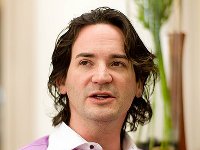 Some of the things Douglas Merrill said are mentioned in this IT World article, I'll list the most provocative of them below. My own experiences working in science, technology and IT for BBSRC and in web development for Unilever strongly support the Merrill view.
Some of the things Douglas Merrill said are mentioned in this IT World article, I'll list the most provocative of them below. My own experiences working in science, technology and IT for BBSRC and in web development for Unilever strongly support the Merrill view.Below each item I've added some questions about common ways we 'do' church. Do we need to rethink?
- Companies stuck in traditional management practices risk becoming irrelevant.
Might this apply to some of the more traditional denominations? Might it even apply to some attempts at smaller, organic expressions of church too? What practices and traditions and habits do we cling to - even though they don't feature in the New Testament? - Leaders should not be afraid to do 'dumb' things. Sometimes being dumb changes the game. (Example - In 1990 a young Kodak researcher invented the charge coupled device which is the core of every camera today. His boss said, 'You're a moron - we make film'.)
Where do these 'dumb' things originate? Often from the 'naive and simple' people on the 'shop floor'. People who know how things really are, people who are not divorced from the practicalities! Managers are often not in touch with reality. How often has a church leader dismissed a good idea as impractical when it might have made a huge difference?
Innovative ideas in technology and business are like inspiration in church. Can we rely too much on the Holy Spirit's guidance and prompting? Should we suppress some of the things he reveals to us? I don't think so!
Just because a new idea challenges the status quo does not mean it is wrong. - The more project management you do the less likely your project is to succeed.
Jesus said, 'I will build my church'; how much room does that leave for project management? If his role is to build, what is your role, what is my role? Hint - we are living stones, he is the builder, what is the role of a stone in the hands of the builder? - It's not about hardware and capex.
Buildings, sound equipment, projection facilities, big budgets - is church about these things? Does it really need these to succeed? What are the truly important things about church? - Build your product and then figure out what to do with it.
If someone comes up with an idea that might work, give it a try. What is there to lose? If it turns out to be effective take advantage of it. If not, look for the next good idea. Be open to spiritual guidance and prophecy. Test prophecy, in fact test everything. But don't reject something just because it's new or different.
When Jesus gives you something but you're not yet clear what it's for - ask him to show you. - The most important thing to take advantage of is to see innovation from everywhere - inside and outside.
Steal good ideas wherever you see them! Something that works well in other walks of life may adapt very well for church application. Be wary and alert, not everything is suitable or beneficial but rejecting an idea just because it comes from business or education or entertainment is foolish. - It is prudent not to listen too carefully to customers ... you can't ask your customers what they want if they don't understand your innovation.
For 'customers' read people who need to get to know Jesus. Don't pay too much attention to what people say they need. Show them love, demonstrate the truth, let the light shine. - Don't lose the ability to learn from the people who do the work. People will do what you measure - make sure you measure the right stuff.
Don't pay attention to things like tithing, attendance figures, outreach programs. Instead try to find ways to 'measure' (in the loosest sense) love, caring attitudes, gentleness, wisdom, joy, and peacefulness. Give out feedback on what you see. If you tell someone how impressed you were at the thoughtful and loving way they handled a situation they will be encouraged. Never miss an opportunity to encourage! - Hire someone who annoys you as they are more likely to be diverse and diverse practices are better.
The hiring part probably isn't relevant, but do try to spend time with people who will challenge your actions and words and motives. Don't avoid people who think differently from the way you do. Make up your mind to benefit and grow in grace through everyone you meet, however inconvenient or unattractive they might seem at first. - The single most common thing executives do is get in the way.
Hmm... Who are the executives in church life? Don't listen to them! Love them, but step around them when necessary. We have one head, not many headlets. - The culture of secrecy in business is a fallacy and people should talk about everything, well, almost everything. IT security people tell you what you can't say and HR people say you might hurt people's feelings, but the actual stuff you need to keep secret is small.
Be suspicious of any areas of secrecy in church life. There is no place for 'us and them', for clergy and laity, for special and ordinary. Sometimes there's a need for confidentiality, but ideas, plans, proposals and decisions should all be as open as possible. Everyone should be involved in these aspects of church.
Food for thought? Please leave some comments, I'll check back to reply.








